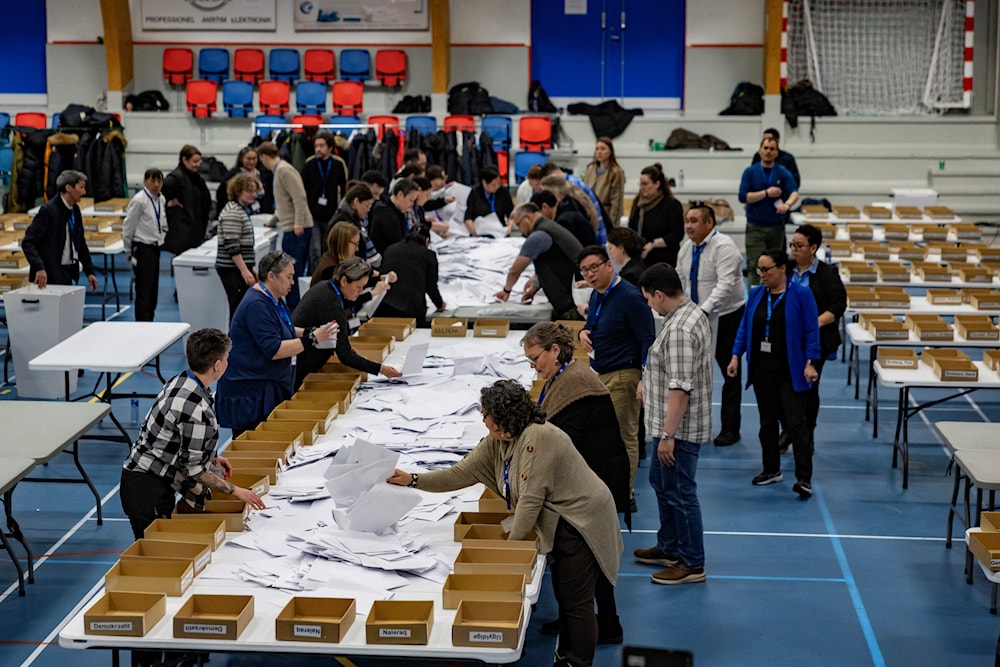Greenland party that told Trump 'No' wins election with 29.9% of votes
The incoming government is expected to outline a timeline for Greenland’s independence, a goal supported by a significant majority of its 57,000 residents.
-

Election workers begin counting the votes after the polls closed in Nuuk, Greenland, on March 11, 2025, on the day of the autonomous Danish territory's legislative elections. (AFP)
Greenland’s center-right opposition party, which famously told US President Donald Trump that the country was "not for sale," has won the country’s parliamentary elections, according to official results.
The Demokraatit party secured 29.9% of the vote, stripping the center-left's ruling coalition of its majority and positioning itself as a decisive force in Greenland’s political future.
Party leader Jens Frederik Nielsen, a former badminton champion, has been a vocal opponent of foreign interference, particularly in response to Trump’s repeated assertions that the US could purchase the Arctic island.
Demokraatit, which advocates for a gradual path to independence from Denmark, saw a significant rise in support, up from 9.1% in the previous election. The party outperformed the nationalist Naleraq party, which favors a swift break from Danish rule.
The pro-independence Naleraq saw its support more than double to 24.5% of votes, placing it second behind Demokraatit. The two parties in the outgoing center-left coalition government came in third and fourth place.
"We respect the election result," outgoing Prime Minister Mute Egede, who leads the left-green Inuit Ataqatigiit (IA) party, told Greenland's public broadcaster KNR, while the leader of the Siumut party, IA's coalition partner, conceded defeat.
With no party securing a majority in Greenland’s 31-seat parliament, negotiations to form a coalition government will take place in the coming days.
The incoming government is expected to outline a timeline for Greenland’s independence, a goal supported by a significant majority of its 57,000 residents.
"The Democrats are open to talks with all parties and are seeking unity. Especially with what is going on in the world," said Nielsen, expressing his surprise by the party's victory.
"We didn't expect the election to have this outcome, we're very happy."
Trump’s influence loomed over the election amid ongoing debates about Greenland’s sovereignty. The US president has long expressed interest in acquiring Greenland, first raising the idea during his initial term in office and reiterating it this year.
Almost 90% of the population are Inuits, many of whom feel they have been treated as second-class citizens by Denmark, Greenland’s former colonial ruler. They accuse Denmark of historically suppressing their culture, conducting forced sterilizations, and removing children from their families.
All of Greenland’s major political parties advocate for independence but differ on the timing.
While Naleraq favors rapid independence, others argue that Greenland should first achieve financial self-sufficiency before severing ties with Denmark.
Greenland, 80% of which is covered in ice, relies heavily on its fishing industry, which accounts for nearly all of its exports, and on annual Danish subsidies exceeding $565 million—equivalent to about one-fifth of its GDP.
Ahead of the election, Trump again floated the possibility of purchasing the island and did not rule out using force to achieve his goal.
"One way or the other we're gonna get it," he told the US Congress earlier this month. He also asserted that Greenlanders could become "part of the greatest nation anywhere in the world" and, in a post on his Truth Social platform, pledged to invest billions "and make you rich."
In response to a recent bill banning foreign donations to political parties, Nielsen condemned Trump’s remarks, calling them "a threat to our political independence."
"We must defend ourselves," Nielsen told Sky News. "I hope it sends a clear message to him that we are not for sale," he stressed, referring to Trump's remarks.
"We don't want to be Americans. No, we don't want to be Danes. We want to be Greenlanders. And we want our own independence in the future. And we want to build our own country by ourselves, not with his hope," Nielsen affirmed.
In January, Nielsen signed a political cooperation agreement with Denmark’s Liberal Alliance, Danish newspaper Berlingske reported. "We are in the midst of an exciting and crucial time in the relationship between Greenland and Denmark," he stated.
Read more: China stresses adherence to UN Charter after Trump's Greenland remarks

 4 Min Read
4 Min Read








